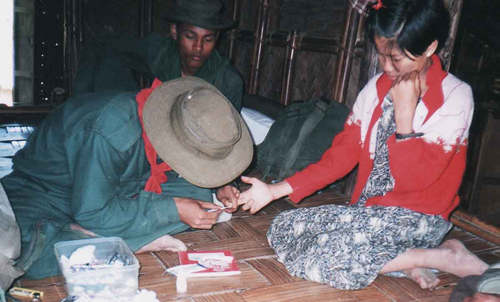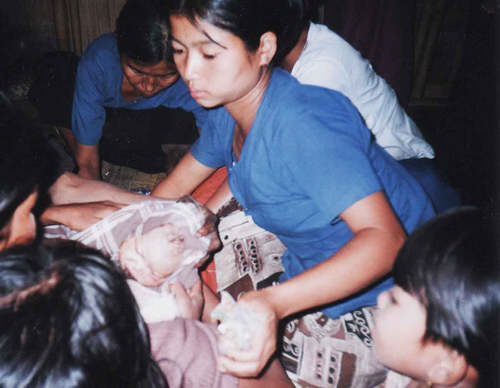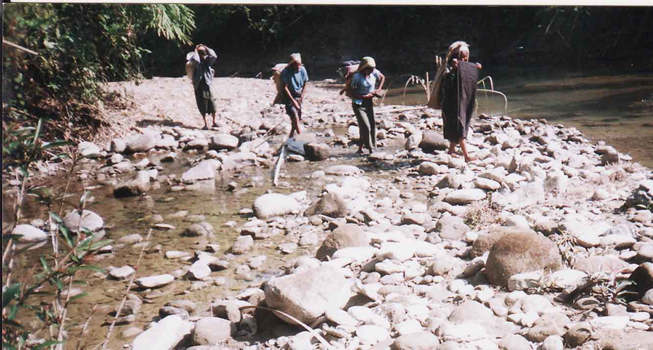|
“One day you must vomit up that rice.” -Burma Army Officers to famine victims in Western Burma.
Report sent by Arakan Free Burma Ranger relief team providing famine relief and medical care in Western Burma:
In the area where our team works thousands of people need emergency food supplies. They are crying with hunger. Their rice crops have been destroyed by rats. In this area approximately 50% of the farmers got 10% of their expected rice harvest, 30% of the farmers got 5% and another 20% of the farmers did not get anything. The military regime is obstructing relief to the famine-affected areas. Christian associations have given rice but the Burma Army camp officers have not allowed those donations through to villagers in many areas. The military government has not helped the farmers whose fields were eaten by rats. Moreover, the regime’s soldiers have used the rice at the Army Camps. Our Free Burma Ranger team has gone directly into villages and distributed rice to famine-affected villagers. The news of these distributions has reached the Burma Army camps. Army officers reportedly got angry and then warned and intimidated villagers, saying things like, “one day you must vomit up that rice”
The Free Burma Ranger relief teams are continually working for Internally Displaced People, refugees, to help famine victims and alleviate any other suffering at Indo-Burma and Bangladesh and Burma border areas and inside Arakan areas since 2003. This report of FBR relief teams will be 11th report of FBR Arakan relief teams.
We give relief materials such as food, medicine, medical treatment, money and educational materials. We document violations of human rights that are abused by the military regime, armed groups and other authorities. We pray and ask God together for peace, justice, freedom and human rights. We must face military operations and due to the attacks our relief teams must go with security.
The people warmly welcome FBR and they are very happy to see us. IDPs, suffering people and villagers experiencing famine are waiting for us because they believe that we can help free them from their suffering and understand that we can do something for them. By the grace of God all of our team members and IDPs love and enjoy each other.
We really thank, appreciate and respect Free Burma Ranger leaders, FBR members and all of our donors. We thank the media and other supporters who provide money, advise and give training to promote health and a higher living standard for IDPs.
Thank you,
Yours Sincerely,
Arakan Team Leader
Free Burma Rangers
Note: The cause of the current famine is the flowering of Bamboo, the increase of rats that feed off the bamboo and the resultant invasion of rats into farmers fields. This combined with increasing rice prices makes the problem very serious. The bamboo flowering occurs every 50 years or so, and has resulted in an infestation of rats, first eating the flower seeds, then rabidly multiplying and then destroying the villagers’ crops. This problem started again in 2007 and continues to spread affecting Mizoram in India, Chittagong Hill Tracts in Bangladesh and Chin State and North Arakan State of Burma. For more information please see the Chin Human Rights Organization website: www.chro.org
 |
| Arakan relief team gives medical treatment to villagers in western Burma |
 |
|
Arakan relief team helps deliver a baby |
 |
|
Arakan villagers fleeing from attacks |
|
|
1. Introduction
Free Burma Ranger Teams are bringing relief to the Internally displaced people (IDPs), refugees and villagers suffering under Burma’s military regime. The team works in western Burma. We document the violations of human rights, the condition of students, health, the IDP situation, the villagers’ conditions and we interview the suffering people. We help the people mentally and physically. When IDPs run from attacks by the regime, we help carry their belongings. We help with burial costs and give a donation when poor families have lost a loved one. We meet students and learn their needs and supply as many materials for them as we can. Sometimes we decide to hold a festival to make the refugees and IDPs happier. We have found that throughout the years the Burma Army violates human rights most often by burning down houses, raping women, destroying shelters and hiding places, looting the villagers’ belongings and killing people.
2. Emergency conditions
In the area where our team works thousands of people need emergency food supplies. They are crying with hunger. Their rice crops have been destroyed by rats. In this area approximately 50% of the farmers got 10% of their expected rice harvest, 30% of the farmers got 5% and another 20% of the farmers did not get anything. The military government has not helped the farmers whose fields were eaten by rats. The military regime is obstructing relief to the famine-affected areas. Christian associations have given rice but the Burma Army camp officers have not allowed those donations through to villagers in many areas. Moreover, the regime’s soldiers have used the rice at the Army Camps. Our Free Burma Ranger team has gone directly into villages and distributed rice to famine-affected villagers. The news of these distributions has reached the Burma Army camps. Army officers reportedly got angry and then warned and intimidated villagers, saying things like, “one day you must vomit up that rice”.
The price of rice has jumped from 8,000 Kyat to 45,000 Kyat. Illegal military check points are still demanding 2500 Kyat. Rice businessmen must go through more than 4 illegal check points on their trade routes.
Due to the rising rice prices most villagers cannot do jungle cultivation. Villagers have prepared their jungle rice fields but do not have paddy rice to plant their crops with. Some villagers are forsaking their paddy farms because of this famine.
Therefore, we expect this famine to continue for many years. Some people have already died from hunger. We cannot provide rice to all of those suffering. Lack of nutrition been a cause of increased sickness and disease in the people we helped during our mission.
3. Activities of the Burma Army
The number of Burma Army soldiers and army camps have increased. The number of operations the Burma Army soldiers go on has also increased. Burma Army and ALA (Arakan Liberation Army) battles have also been increasing. Burma Army soldiers demand chickens, pigs, bamboo, and forced labor from villagers. Many young girls have been forced to marry Burma Army soldiers. The soldiers also demand money, force children to join the Burma Army and treat people in other inhumane ways. The Burma Army does not respect the law. When Burma Army battalions move out of the area, some soldiers often do not take their wives with them. Those women are left alone. Villagers are also forced to carry Burma Army rations from one village to another village.
4. Violations of Human Rights
Our relief team documented many Burma Army violations of human rights. Those violations include forced labor, forced relocation, illegal taxes, religious discrimination, forced conscription, the stealing of chickens, pigs, other domestic animals, bamboo, wood, honey, and traditional flowers.
Each regiment is in one area for only four month and then rotates. The officers and his followers do as they like during the time they are stationed in one area. One example of the abuses these short stays encourage happened in the upper Palawa Township area. While Burma Army Light Infantry Battalion 20 was there, the battalion commander (Thanzin Htun) was being charged with rape and was tied up in court.
During this battalion duty term 5 ladies from D** C** village, M** village, C*** village, N** village and Th** village married Burma Army soldiers. Two ladies were persuaded to marry because their parents are poor and affected by the famine. Only one lady married for love, the others were forced. Currently Burma Army battalion 538 commander (Aung Htwee) is facing charges for corrupting UNDP money and public money. They do not operate lawfully, and I do not see that they understand about law. They only know the power of the gun.
5. News
Burma Army orders arrest of relief team leader, people forced to vote yes in the dictators’ referendum and villagers left homeless and not allowed to stay with relatives after fire destroys 78 houses.
June 2008
Burma Army orders arrest of Arakan relief team leader.
On 8 June, 2008, Aung Htwee, the current Burma Army commander in an area where our team works, called village leaders together. He pressured those villages to restrict the FBR relief activities helping those oppressed by the Burma Army. He gave an order to arrest the leader of the Arakan relief team.
May 2008
Arakan villagers threatened with jail if they voted no in the Regime’s referendum:
Four people were arrested and put in Chinlawa Army Camp for distributing postcards in opposition to the constitution referendum being held by Burma’s military regime. They were brutally tortured by Burma Army soldiers and two of them had broken bones. One month later two were forced to join the Burma Army when they were set ‘free’.
Before the referendum began, the Burma Army issued an order to local village heads that if over 50% of any village voted ‘NO’, the head of the village had to report to the district office. The voting would then be scrutinized and anybody with no citizenship card or not included on the voter list would be arrested and jailed for 6 years. A later order was given by the committee of the referendum in our area who said anyone who voted ‘NO’ would be sent to Jail. So villagers did not vote. The leaders of their villages voted on behalf of all the villagers. Arakan resistance in the area distributed educational materials about the referendum and urged people to vote ‘NO’. The Burma Army responded with heavier patrols of the area and there are still high tensions in these areas because of the activities during the referendum.
Refugees unwanted in border areas:
In the border area, refugees are facing big problems not only due to famine but also their status in neighboring countries. Local authorities and villagers in those countries do not want Arakan refugees in their area. The rising rice prices are also increasing the desire to expel all Arakan refugees. There were increased complaints in May (2008) by those authorities and local villagers.
April 2008
78 Houses burned down and residents not allowed to move in with relatives:
78 houses in K*** village burned down on April 2008 after a fire started in one home and spread to the others. The Burma Army in that area did not respond with any help for those who lost their homes. The villagers who were left homeless wanted to move in with relatives in neighboring villages but were not permitted to do so by the Burma Army. The Burma Army reportedly said that anyone who moved from that devastated village would have to do one year of forced labour for the army with no compensation. Before the fire there were a total of 128 houses in the village.
The Burma Army gave authority to a Buddhist organization to demand money from each village for a Buddhist development foundation. This organization is demanding 50,000 Kyat from each village at the Kyauk Taw Township and Palawa Township. Anybody who joins this organization will not have to do forced labor for the Burma Army. In Arakan state, there are four groups that do not have to do forced labor for the army: 1. The family members of a Burma Army soldier, 2. The family members of a lady who marries a Burma Army soldier, 3. People from upper class families, 4. People (and their families) who join the Buddhist religious organization mentioned above.
6. Health
Our relief team gives medical treatment and medical tests to IDPs, refugees and villagers. On our missions, we have found the main problems are malaria, dysentery, beriberi, asthma, gonorrhea, pneumonia, anemia, pain, common cold, hypertension, skin infection, diarrhea, typhoid, malnutrition and cholera. During this season many people are diagnosed with lack of nutrition, malaria and the common cold.
Increasing health problems are due to food security. People are not getting enough nutrients and are becoming very weak. We will need more medicine, emergency medical training, and public education for health in the coming months and years. Next year our relief team will need more supplies for emergencies than we needed in past years.
7. Education
We learned about the education situation for children and supplied some school material and money for further education. The famine has kept many children home from school; many village community schools have shut down during the famine. The schools are always asking FBR for help. In this area people need emergency supplies and international organizations to help.
8. Relief
Currently, our FBR relief team brings rice, money, medicines, school materials, clothes and other help to IDPs, refugees and villagers. This year, our Free Burma Ranger team gave more emergency relief supplies than last year. The Burma Army sometimes disrupts our relief missions to those in need. We need increased resources for famine relief.
Thank you and God bless you,
Arakan Free Burma Rangers
